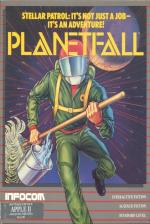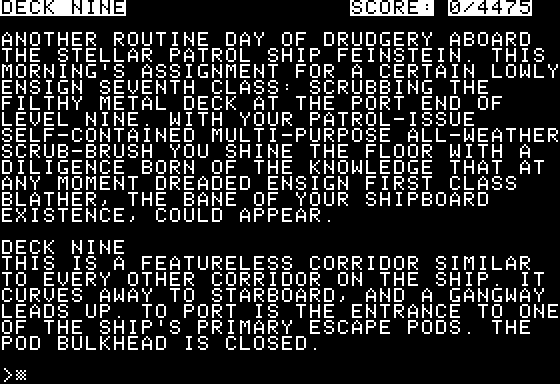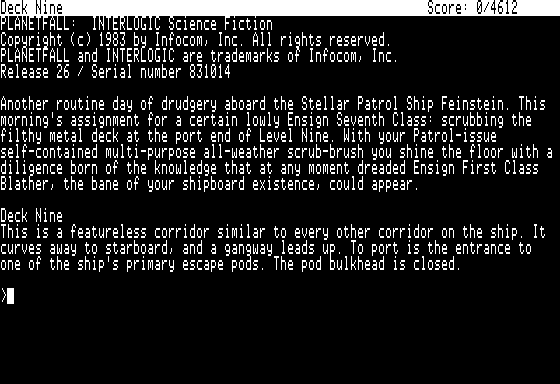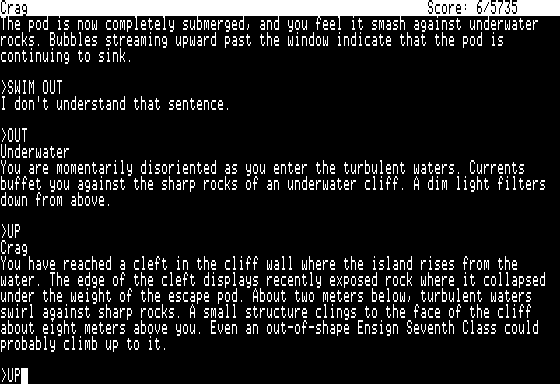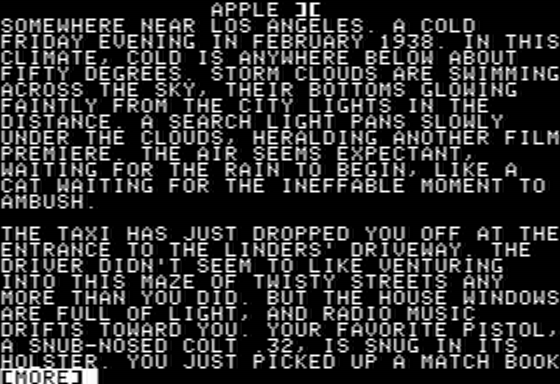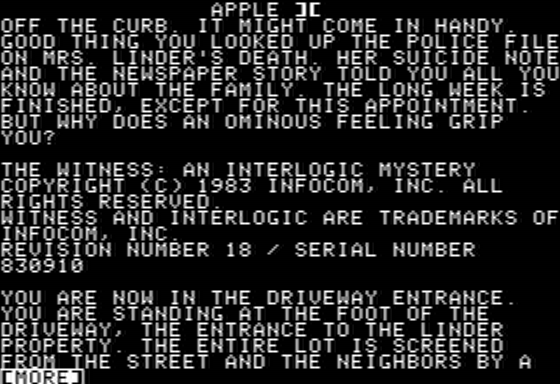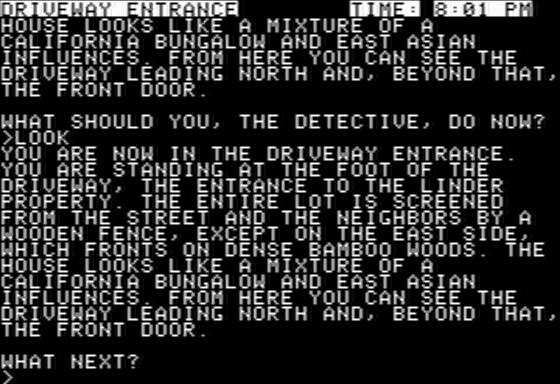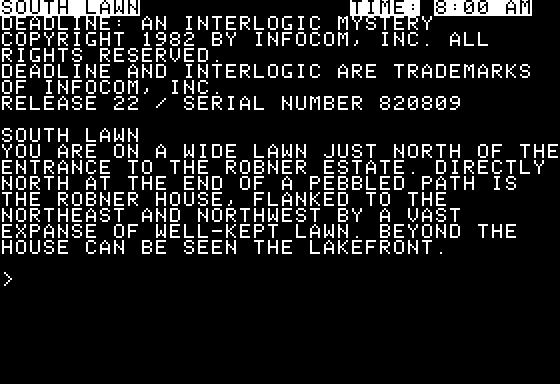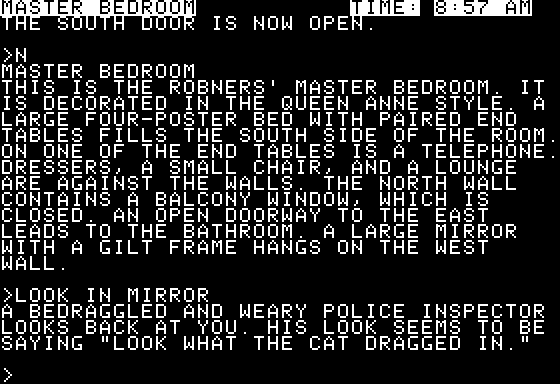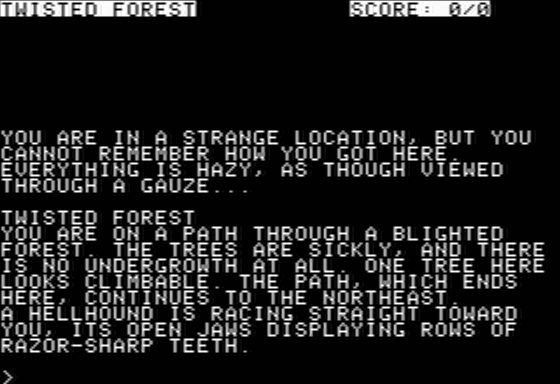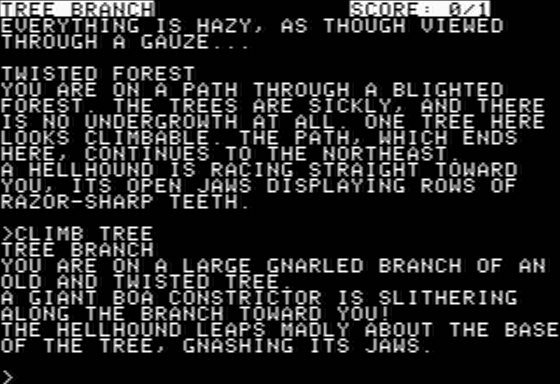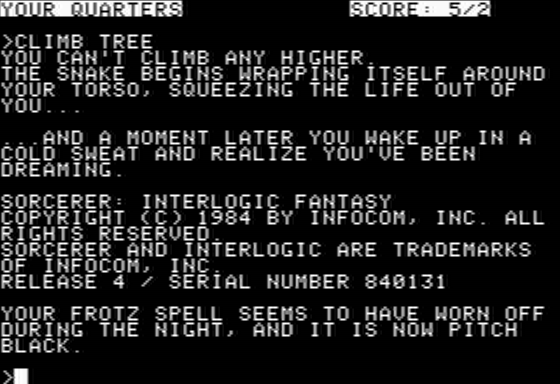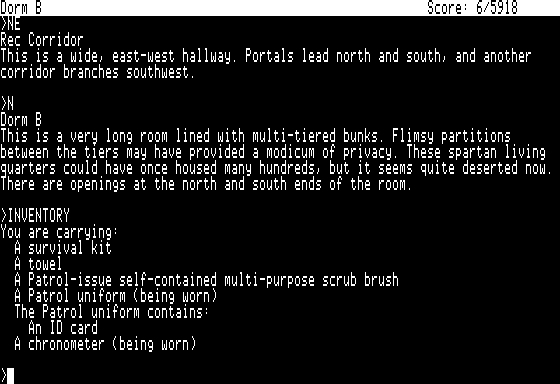
Database
 1st February 1985
1st February 1985
Categories: Review: Software
Author: Julian Brewer
Publisher: Infocom
Machine: Apple II
Published in Apple User Volume 5 Number 2
In The Footsteps Of Zork
Five years ago Infocom released their first product. It was called Zork I and it was a pretty revolutionary slice of software, a new form of text adventure. Zork, an underground adventure, changed the dull tradition of verb-noun inputs into complex sentences. People used to type "Kill troll". Now they could "Jump on the troll then stab him with the dagger". Not much fun for the troll, but a whole lot more fun for the player.
Towering over old games was a vocabulary of more than 500 words. And with this freedom of input came a vast and complex world to explore. A real chart-topper.
Since then, Infocom have released thirteen text-only adventures. Each has maintained a tradition of high quality. This has always been reflected in the superb packaging and documentation.
Each instruction manual is plastered with the wit of a genius, and splashed with paints that spare no detail. The descriptions and responses within the game are equally lavish. I have been looking at five of their games recently - Planetfall, Enchanter, Sorcerer, Deadline and Witness.
Planetfall
Planetfall is the latest of their SF games. Often its problems are of a technical nature. Being more of a fantasy man, I found this one very tricky. In fact, it reminded me of that old classic "Mission Impossible".
To me "Mission Impossible" was impossible. Let's just say I haven't *quite* finished Planetfall yet!
As an Ensign 7th Class of the Stellar Patrol, your abilities are stretched to the full. Your awesome task - scrubbing the deck of the starship Feinstein! But very soon Ensign 1st Class Blather reminds you how terribly real Infocom characters are.
"You call this polishing, Ensign Seventh Class? We have a position for an Ensign Ninth Class in the toilet-scrubbing division, you know. Thirty demerits!"
Then it's bye-bye to Blaster as disaster hits the Feinstein, leaving you marooned alone on a deserted planet.
Exploring the buildings of the twin complexes on the planet can get lonely, until you discover Floyd. This little guy is a robot, and he's the solution to several problems in the game. His masterpiece of a character is typical of Infocom.
There seems to be no aim to the game at first other than to explore and survive. The one problem playing Planetfall is that you are never quite sure why you are doing just wait you are.
While perhaps this makes the adventure more exciting, frustratingly tossing a puzzle to the heap of other unsolvables often results. Why waste time solving a problem of no apparent benefit?
Positively, Planetfall is a very funny comedy. Responses are very often hilarious, and Floyd is particularly amusing. Descriptions are brief yet graphic.
The package spares no expenses - a folder opens to reveal pockets containing an instruction manual, an identification card, interplanetary postcards ("Wiggle on over to Nebulon, home of the Worm People"), and a very funny diary recounting your exploits in the Stellar Patrol up to date. I only wish I could win!
In Deadline and Witness you become your favourite detective. Complex characters replace the vast number of rooms found in adventures, and the hunt for objects is replaced by the hunt for clues.
In the other games it's points you are after. In these two, it's the time limit that sets the challenge.
Witness
Witness has the 1930s perfected. The game and documentation together create an atmosphere that Deadline definitely lacked. What is more, improvements have been made in the interpretation routines. As a result, it is altogether easier to question suspects.
The descriptions and characters are often brilliant. I think the guy who wrote the story could be writing best-selling novels. The lowdown is that a high class society dame has been murdered.
Her old man (sorry folks, the lingo's straight from the game!) worries that he'll be the next stiff. What can you do, detective? The client's life is at stake, so make no mistakes.
Your case starts outside his house where a red matchbook turns up. Could this be your first clue?
The literature in the package is outstanding. There's a "National Detective Gazette" which among the '30s memorabilia includes hints on how to play the game. A newspaper outlines the stories of the day, including the murder that introduced the case. Even a telegram and suicide note are included, and the matchbook found outside the house completes the package in style.
Deadline
Deadline launches you into the Robner estate, where Mr. Robner has died of an overdose. Suicide probably. But why was he about to change his will?
Sergeant Dufft will fingerprint anything for you, or take objects to the lab for analysis. With his help, you must uncover any foul play. Having gathered enough clues, you may arrest your suspect and await the outcome of the trial - so they tell me!
The pot pourri of supplementary evidence in the package includes notes from interviews with all the main characters, a coroner's examination, a photograph from the scene of the death, a lab report, and even three tablets from the suicide bottle! Official letters outline your task, complementing an informative inspector's casebook.
Be careful Watson, these cases are not elementary!
Enchanter and Sorcerer kick off a series of magical quests by Infocom. The nicknames, Zork IV and V, reflect the similarity of style with the Zork trilogy.
Their hallmark is the spell book. Throughout the games, you discover more and more spells to add to your collection. They may be cast on almost anything, a terrific accomplishment by the programmers.
Some spells found on scrolls are too powerful to learn, and may only be cast once. Often, such a spell could solve many problems, but to which one is it the unique solution? Using it unnecessarily will thwart the quest.
Enchanter
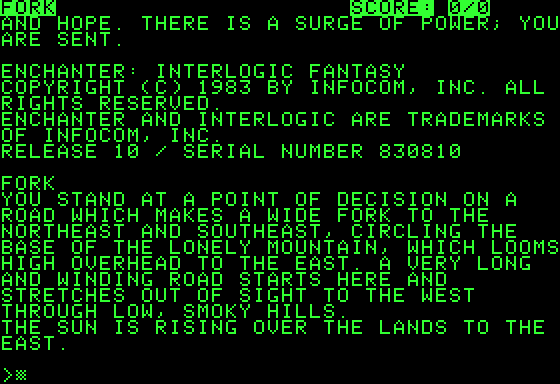
In Enchanter, your adventures start when the Circle of Enchanters summons you. Dark times have arrived, you are told. Krill's power is strengthening and its influence is stretching.
An ancient document speaks of such times, and declares that a young novice enchanter like yourself must go forth and discover Krill's secrets. To send a more powerful enchanter would too soon reveal the power of the circle. You must explore Krill's castle, and bring back his dark secrets.
This is the introduction to a superb game, my favourite of the five. Delve deep into the castle, discover magic, uncover sinister secrets, dream strange dreams.
Dreams? That's right, you actually *live* Infocom games. Forget to sleep and you are too tired to remember spells. Eat, or starve to death. Drink, or die. No two ways about it.
The characters in Enchanter are all beautifully developed. Owners of the Zork trilogy will especially enjoy the familiar adventurer who is found along the way.
Just as well developed is the mysterious atmosphere. Playing the game is like reading a fairy story. Just don't expect a happy ending all of the time. Krill isn't smiling because he likes you!
Equally magical is the packaging. Enclosed is the sealed document that defines your task. It's on parchment paper, and I'm still not sure if the ink is dry. Prepared by the "Printer's Guide" is an instruction manual, a fine work of calligraphy.
Sorcerer
In Sorcerer you are the feated Krill. But a new task is at hand. Belboz, the leader of the Circle of Enchanters, has disappeared. His abandoned cryptic diary hints that he has falled victim to evil sorcery. You must find Belboz and rescue him from... from what?
An engrossing magical kingdom opens itself for exploration. The kingdom is large and diverse. Problems from magical minefields to a menacing hawker in an amusement park face you. A worthy sequel to Enchanter.
The packaging is once again out of this world. Especially peculiar is the "infotater", a windowed envelope containing a rotating disc which reveals information about monsters when turned. The solution to a problem perhaps?
Both adventures have fascinating puzzles. There is no messing around with nonsensical solutions. Each problem is charming, yet has a logical end.
I think these games come closer to the non-computer role-playing games such as Dungeons and Dragons than do adventures like Wizardry. Highly recommended for fantasy fanatics.
Each Infocom game is very convenient to play. Saving the play to disc is possible at any point, and there are single letter abbreviations for several common commands.
If you have been in a room more than once, descriptions are shortened. In fact, a whole list of features cater for every fuss. The play may even be recorded on a printer.
Excellent hint books and maps are available from Infocom if you get desperate. Even if you have to resort to such devices, you should still be able to enjoy the games because care has been taken not to give too much away.
There is no doubt that Infocom games are immensely popular. Why? Because of the full-sentence input? The latest games have 1,000+ vocabularies. Because of the superb realism? Playing a game is like acting out a book. Perhaps because of the fine attention to detail? The packages are ever more spectacular.
Whatever it is, people will rave about these games until the cows come home.
Other Reviews Of Planetfall For The Apple II
Planetfall (Infocom)
A review
Planetfall (Infocom)
A review by Paul Coppins (C&VG)

